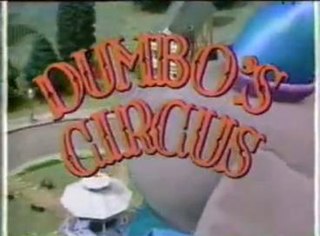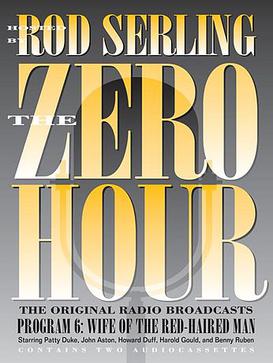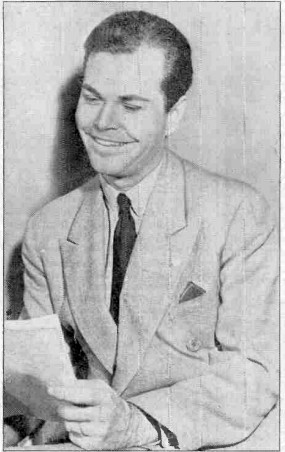
I Love a Mystery is an American radio drama series that aired 1939–44, about three friends who ran a detective agency and traveled the world in search of adventure. Written by Carlton E. Morse, the program was the polar opposite of Morse's other success, the long-running One Man's Family.

Let's Pretend, created and directed by Nila Mack, was a CBS radio series for children. Prior to being renamed Let's Pretend, the program had a variety of titles and formats. In its most famous form, Let's Pretend, the Peabody Award-winning series ran from 1934 to 1954.
Frontier Gentleman is a short-lived radio Western series originally broadcast on the Columbia Broadcasting System (CBS) radio network from February 2 to November 16, 1958, initially heard Sunday afternoons at 2:30 p.m. through March when it moved to 7 p.m.

Dumbo's Circus is a live action/puppet television series that aired on The Disney Channel beginning on May 6, 1985 to May 25, 1986. and featured the character of Dumbo from the original film. Reruns continued to air until February 28, 1997.

Frankie Darro was an American actor and later in his career a stuntman. He began his career as a child actor in silent films, progressed to lead roles and co-starring roles in adventure, western, dramatic, and comedy films, and later became a character actor and voice-over artist. He is perhaps best known for his role as Lampwick, the unlucky boy who turns into a donkey in Walt Disney's second animated feature, Pinocchio (1940). In early credits, his last name was spelled Darrow.

Arthur John Miles Anderson was an American actor of radio, film, television, and stage.

The Chase and Sanborn Hour is the umbrella title for a series of American comedy and variety radio shows sponsored by Standard Brands' Chase and Sanborn Coffee, usually airing Sundays on NBC from 8 p.m. to 9 p.m. during the years 1929 to 1948.
Magic Island was a science-fantasy radio serial syndicated in the late 1930s and 1940s. The series had 130 15-minute episodes, and all episodes have survived.

Mr. Keen, Tracer of Lost Persons was one of radio's longest running shows, airing October 12, 1937 to April 19, 1955, continuing well into the television era. It was produced by Frank and Anne Hummert, who based it upon Robert W. Chambers' 1906 novel The Tracer of Lost Persons. The sponsors included Whitehall Pharmacal, Dentyne, Aerowax, RCA Victor and Chesterfield cigarettes. It aired on the NBC Blue network until 1947, when it switched to CBS.

The Zero Hour was a 1973–74 American radio drama anthology series hosted by Rod Serling. With tales of mystery, adventure and suspense, the program was broadcast for two seasons.

Our Gal Sunday is an American soap opera produced by Frank and Anne Hummert, network broadcast via CBS from March 29, 1937, to January 2, 1959, starring Dorothy Lowell and, after Lowell's 1944 death, Vivian Smolen in the title role.

Shell Chateau was a musical variety radio series heard on NBC from April 6, 1935 to June 26, 1937. Sponsored by Shell Oil, the hour-long program, sometimes called The Shell Show, was broadcast on Saturday evenings at 9:30pm.
Hollywood Hotel is an American radio program that was broadcast in the 1930s. It featured Hollywood stars in dramatized versions of then-current movies and "helped to make Hollywood an origination point for major radio programs." Radio historian John Dunning called the program, sponsored by Campbell Soup Company, "the most glamorous show of its time." The program was the inspiration for the 1937 Warner Brothers movie of the same title, which featured Louella Parsons as herself.
The Roy Rogers Show was a 30-minute Western radio program in the United States. It began in 1944, ended in 1955, and was carried on more than 500 stations. Because of demands on Rogers' time for personal appearances and making films, the show was one of the first radio series to be transcribed.

Chick Carter, Boy Detective is a 15-minute American old-time radio juvenile crime drama. It was carried on the Mutual Broadcasting System weekday afternoons from July 5, 1943, to July 6, 1945.
Hawk Larabee is an American old-time radio western. It was broadcast on CBS from July 5, 1946, until February 7, 1948.
Hop Harrigan is an American old-time radio juvenile adventure program. It was broadcast on ABC from August 31, 1942, until August 2, 1946, and on Mutual from October 2, 1946, until February 6, 1948. General Foods began sponsoring the program on October 2, 1944; it had previously been unsponsored.

Howie Wing is an American old-time radio juvenile aviation adventure serial. It was syndicated by the World Broadcasting System and distributed initially to stations in Canada, beginning on January 31, 1938. The Don Lee Network began carrying it in the western United States on February 12, 1938. The program was broadcast weekdays on CBS from October 3, 1938, until June 30, 1939.

Lassie is an American old-time radio juvenile adventure program. It was broadcast on ABC from June 8, 1947 until May 30, 1948, and on NBC from June 5, 1948, until May 27, 1950.













